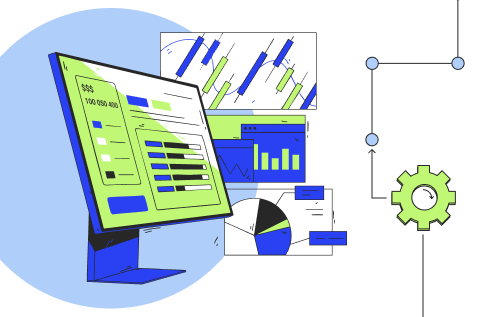Efficiency is the heartbeat of any successful healthcare operation, especially in the context of provider networks. As healthcare organizations grapple with an intricate web of regulatory demands and patient expectations, there’s an increasing need to achieve optimal operational efficiency to remain competitive and facilitate sustainable growth.
Healthcare organizations wrestle with an array of provider operations responsibilities, with credentialing providers being one of the most time-consuming. The average credentialing and payer enrollment process typically takes between 90-120 days, given the amount of paperwork to complete, and for every hour of direct clinical face-time with a patient, physicians spend nearly two additional hours on administrative work.
These organizations must navigate a labyrinthine mix of complex processes, regulatory requirements and facilitate communication among a diverse group of stakeholders. Add to these the multitude of administrative tasks such as patient scheduling, and provider data updates, license and renewals tracking, enrollment status, and it’s easy to see how resources can be stretched thin, impeding overall efficiency.
For healthcare organizations, operational efficiency directly impacts the quality of care delivered to patients and an organization’s bottom line. By investing in automation and solutions that centralize provider operations and the day-to-day administrative tasks, these organizations can work faster, alleviate administrative burdens, improve collaboration and optimize resources to enhance the patient care journey.
The integral role of automation in healthcare operations
Why is automation crucial for provider operations? Given that the average doctor spends 8.7 hours (16.6% of working hours) on administrative tasks per week, the answer becomes clear.
These inefficiencies in credentialing and other administrative tasks cost the U.S. healthcare system between $23 billion to $31 billion annually, according to this report.
By implementing automation, healthcare organizations can address these issues in several ways:
- Reduced administrative burden: Automation streamlines routine tasks, dramatically reducing the time spent on paperwork, completing applications, manually inputting data, tracking license requirements, and more. This time savings means healthcare staff can focus on more critical aspects of patient care. The reduction in manual input also leads to significant time and cost savings.
- Improved accuracy and consistency: Automated systems reduce the risk of human error, ensuring data accuracy and consistency across all processes. This is particularly beneficial for tasks such as billing and coding, where mistakes can lead to revenue loss and compliance issues.
- Enhanced data analytics capabilities: Automation also facilitates the collection and analysis of vast amounts of provider data. This provides healthcare organizations with valuable insights that can be used to improve patient outcomes and drive operational efficiency.
Healthcare processes ripe for automation include appointment scheduling, medical billing and coding, and patient data management. These are all areas where automation can significantly streamline processes, reduce errors and enhance overall operational efficiency.
The power of centralized solutions in healthcare operations
A centralized approach to healthcare operations is like the nervous system of the body - it connects all the parts and ensures they work in harmony. It offers several key advantages:
- Streamlined communication and collaboration: Centralized solutions enable seamless communication and collaboration among different departments and stakeholders, ensuring consistency and reducing the risk of miscommunication.
- Simplified management of resources: Centralized healthcare operations makes resource management easier, ensuring more effective and efficient allocation and tracking of resources.
- Increased visibility and control over key performance indicators: Finally, centralized solutions provide real-time insights into key performance indicators, empowering healthcare organizations to make data-driven decisions and optimize their operations.
The power of technology cannot be overstated in implementing centralized solutions. Cloud-based platforms, real-time analytics, and reporting tools, along with seamless integration with existing healthcare systems, can all play pivotal roles in streamlining workflows and enhancing operational efficiency.
How Medallion streamlines provider operations
Medallion is committed to helping healthcare organizations maximize efficiency through automation and centralized solutions. Our comprehensive provider operations platform is designed to streamline processes, centralize resource management and provide tailored analytics. With these tools, healthcare organizations can amplify staff efficiency and boost their organizational impact.
Here’s how Medallion makes this possible:
- Streamlined and automated processes: Our platform automates crucial but time-consuming tasks such as provider credentialing, license verification, and provider enrollment. This intelligent automation not only reduces the administrative burden on staff but also enhances accuracy, ensuring a consistent and efficient approach to managing provider networks.
- Centralized management of resources and data: Medallion offers a centralized repository for provider data and information, simplifying how admins and providers keep track of it and collaboration among departments and stakeholders.
- Customized analytics and reporting capabilities: Our platform offers tailored analytics and reporting tools, providing healthcare organizations with the actionable insights they need.
Partner with Medallion for improved efficiency and impact
As the healthcare landscape continues to evolve, it is crucial for provider groups to adapt and leverage technology to stay ahead. Implementing automation and centralized solutions not only improves efficiency but also enables healthcare organizations to provide better patient care and achieve long-term success.
Medallion is your partner in achieving operational excellence. We’re committed to helping healthcare organizations enhance their operations through our end-to-end workflow platform. Learn more about how we can amplify your organization’s efficiency and help enable better patient care and outcomes.































